- Home
- James Clavell
Whirlwind Page 54
Whirlwind Read online
Page 54
“Then there’ll be a correct explanation.” Rudi was glad that Hushang had weathered the revolution—particularly as he had always been an outspoken critic of mullahs meddling in government. “You’re sure she was illegal?”
“I’m sure legal airplanes have clearances, legal airplanes obey air regulations, and legal airplanes don’t take evading action and rush for the border,” Hushang said. “And I’m almost sure I saw the S-G emblem on my first pass, Rudi.”
Rudi’s eyes narrowed. Hushang was a very good pilot. “You were flying the intercept?”
“I led the flight that scrambled.”
The silence grew in the trailer. “Do you mind if I open a window, Major? The smoke—it gives me a headache.”
The major said irritably, “If HBC’s an S-G chopper someone’s going to have more than a headache.”
Rudi opened the window. HBC sounds like one of our registrations. What the hell’s going wrong? We seem to be under a spell the last few days—first it was that psychopath Zataki and the murder of our mechanic, then poor old Kyabi, then the God-cursed leftist fedayeen dawn attack yesterday, damn nearly killing us and wounding Jon Tyrer—Christ, I hope Jon’s all right!—and now more trouble!
He sat down again, feeling very weary. “Best I can do is to ask.”
“How far north do you operate?” the major asked.
“Normally? Ahwaz. Dezful’d be about our extreme ra—” The base phone intercom rang. He picked it up and missed the look between the two officers. “Hello?”
It was Fowler Joines, his chief mechanic. “You okay?”
“Yes. Thanks. No sweat.”
“Shout if you need help, old sport, and we’ll all come arunning.” The phone clicked off.
He turned back to the major, feeling better. Since he had stood up to Zataki, all of his men and pilots had treated him as though he were Laird Gavallan himself. And since yesterday when the fedayeen were beaten off, even the komiteh Green Bands had been deferential—all except Base Manager Yemeni who was still trying to give him a hard time. “Dezful’s extreme range—one way. Once we flew…” He stopped. He had been going to say, Once we flew our area manager to Kermanshah. But then the memory of the brutal and senseless way Boss Kyabi had been murdered welled up and again he was sickened.
He saw the major and Hushang staring at him. “Sorry, I was going to say, Major, once we flew a charter to Kermanshah. With refueling, as you know, we’re mobile.”
“Yes, Captain Lutz, yes, we know.” The major stubbed out his cigarette and lit another. “Prime Minister Bazargan, with of course the prior approval of Ayatollah Khomeini,” he added cautiously, not trusting Abbasi or the Green Bands who also might secretly understand English, “has issued strict orders about all aircraft in Iran, particularly choppers. We’ll call Kowiss now.”
They went to the radio room. At once Yemeni protested that he could not approve the call without permission of the local komiteh, of which he had appointed himself a member as the only one who could read or write. One of the Green Bands went to fetch them but the major overrode Yemeni and got his way. Kowiss did not answer their calls.
“As God wants. It’ll be better after dark, Agha,” radio operator Jahan said in Farsi.
“Yes, thank you,” the major said.
“What is it you need, Agha?” Yemeni said rudely, hating the encroachment, the Shah uniforms almost whipping him into a frenzy. “I will get it for you!”
“I don’t need you for anything, son of a dog,” the major shouted angrily, everyone jumped, and Yemeni was paralyzed. “If you give me trouble I’ll haul you in front of our Tribunal for interfering with the work of the prime minister and Khomeini himself! Get out!”
Yemeni fled. The Green Bands laughed and one of them said, “Shall I beat his head in for you, Agha?”
“No, no, thank you. He’s no more important than a fly eating a camel’s turd.” Major Qazani puffed his cigarette, surrounded with smoke, and glanced at Rudi thoughtfully. The news of how this German had saved Zataki, the most important Revolutionary Guard commander in this area, had flooded their air base.
He got up and went to the window. Beyond he could see his car and the green Khomeini flag and the Green Bands lolling around. Scum, he thought. Sons of dogs, all of them. We didn’t get rid of American restraints and influence and help sack the Shah to give over control of our lives and beautiful planes to lice-covered mullahs, however brave some of them may be. “You wait here, Hushang. I’ll leave two Guards with you,” he said. “Wait here and make the call with him. I’ll send the car back for you.”
“Yes, sir.”
The major looked at Rudi, his eyes hard. In English he said, “I want to know if HBC’s an S-G chopper, where it was based, how it got to this area, and who was aboard.” He gave the necessary orders and left in a swirl of dust.
Hushang sent the Guards to tell the others what was going on. Now the two of them were alone. “So,” he said, and smiled and held out his hand. “I’m pleased to see you, Rudi.”
“Me too.” They shook hands warmly. “I wondered how you, er, how you fared.”
Hushang laughed. “You mean if I’d been liquidated? Oh, don’t believe all those stories, Rudi. No. Everything’s great. When I left Kharg I spent a little time in Doshan Tappeh, then came down to Abadan Air Base.”
Rudi waited. “And then?”
“And then?” Hushang thought a moment. “And then, when His Im—when the Shah left Iran, our base commander paraded us, everyone, and told us he considered our oath of allegiance canceled. All of us in the forces swore allegiance to the Shah personally but when he left, our oaths seemed repudiated somehow. Our commander asked us all to choose what we wanted to do, officers and men, to stay or to leave—but, he said finally, ‘On this base the transfer of power to the new legal government will be orderly.’ We were given twelve hours to decide.” Hushang frowned. “A few left—they were mostly senior officers. What would you have done, Rudi?”
“Stayed. Of course. Heimat ist immer Heimat.”
“What?”
“Your homeland is always your homeland.”
“Ah, yes. Yes, that’s what I thought.” A shadow went over Hushang. “After we had all chosen, our commander called in Ayatollah Ahwazi, our chief ayatollah, and formally made the transfer of power. Then he shot himself. He left a note saying, ‘All my life I have served Mohammed Reza Shah, as my father served Reza Shah, his father. I cannot serve mullahs or politicians, or live with the stench of betrayal that pervades the land.’”
Rudi hesitated. “He meant the Americans?”
“The major thinks he meant the generals. Some of us think he meant…the betrayal of Islam.”
“By Khomeini?” Rudi saw Hushang looking at him, brown eyes guileless, chiseled face, and for a second Rudi had the uneasy feeling that this was no longer his friend, but someone wearing the same face. Someone who might be ready to trap him. Trap him into what?
“To think that would be treason. Wouldn’t it,” Hushang said. It was a statement, not a question, and another shaft of caution went through Rudi. “I’m frightened for Iran, Rudi. We’re so exposed, so valuable to either superpower, and hated and envied by so many nearby.”
“Ah, but your forces are the biggest and best equipped around—you’re the power in the Gulf.” He went to the small built-in refrigerator. “How about splitting an ice-cold bottle of beer?”
“No thanks.”
Usually they would share one with relish. “You on a diet?” Rudi asked.
The other shook his head, smiled strangely. “No. I’ve quit. It’s my gift to the new regime.”
“Then we’ll have tea, like old times,” Rudi said without missing a beat, went into the kitchen, and put on the kettle. But he was thinking, Hushang really has changed. But then, if you were him, you’d’ve changed too, his world’s upside-down—like West Germany and East Germany but not as bad as that. “How’s Ali?” he asked. Ali was Hushang’s adored elder brother, a
helicopter pilot, whom Rudi had never met but Hushang was always talking about, laughing about his legendary adventures and conquests in Tehran, Paris, and Rome in the old days—the good old days, he thought emphatically.
“Ali the Great’s fine too,” Hushang said with a delighted smile. Just before the Shah had left they had secretly discussed their options and had agreed, whatever happened, they would stay: “We’re still the elite force, we’ll still have leaves in Europe!” He beamed, so proud of him, not envious of his successes but wishing he could be a tenth as successful. “But he’ll have to slow down now—at least he will in Iran.”
The kettle began boiling. Rudi made the tea. “Mind if I ask you about HBC?” He glanced through the doorway into the other room. His friend was watching him. “That all right?”
“What do you want to know?”
“What happened?”
After a pause Hushang said, “I was leader of the duty flight. We were scrambled and told to intercept a helicopter that had been spotted sneaking through the area. It turned out to be civilian, ducking in and out of the valleys around Dezful. She wouldn’t answer radio calls in Farsi or in English. We waited, trailing her. Once she was out in the open I buzzed her, that’s when I thought I recognized the S-G emblem. But she completely disregarded me, just turned for the border and poured on the coals. My wingman buzzed her but she took more evading action.”
Hushang’s eyes narrowed as he remembered the excitement that had possessed him, hunter and hunted, never having hunted before, his ears filled with the sweet scream of his jets, with static and with orders: “Arm missiles!” Hands and fingers obeying.
Pressing the trigger, the rocket missing the first time as the chopper pirouetted, darting this way and that, nimble as a dragonfly, his wingman also firing and missing by a fraction—the missiles not heat-seekers. Another miss. Now she was over the border. Over the border and safe but not safe from me, from justice, so going in with cannons blazing, impression of faces at the windows, seeing her dissolve into a ball of fire and when I came out of the G-wrenching turn to look again she had vanished. Only a puff of smoke remained. And the pleasure.
“I plastered her,” he said. “Blew her out of the sky.”
Rudi turned away to hide his shock. He had presumed HBC had escaped—whoever was flying. “There were no…no survivors?”
“No, Rudi. She exploded,” Hushang said, wanting to keep his voice calm. And professional. “It was…it was my first kill—I never thought it would be so difficult.”
Not much of a contest, Rudi thought, enraged and disgusted. Missiles and cannons against nothing, but I suppose orders are orders and HBC was in the wrong whoever flew her, whoever was aboard. She should have stopped—I would have stopped. Would I? If I’d been the fighter pilot and this was Germany and the chopper was fleeing toward the enemy-controlled border with God knows what aboard and I was on orders to… Wait a minute, did Hushang do it in Iraqi airspace? Well, I’m not going to ask him. As sure as God doesn’t speak to Khomeini, Hushang wouldn’t tell me if he did—I wouldn’t.
Gloomily he filled the teapot from the kettle and was reminded of the other one from his childhood, then glanced out of the window. An old bus was stopping on the road outside the airport perimeter. He saw the tall man get out. For a moment he did not recognize him. Then, with a whoop of delight, he did, and said on the run, “Excuse me a moment…”
They met at the gate, Green Bands watching curiously. “Tom! Wie geht’s? How are you? What the hell’re you doing here? Why didn’t you tell us you were coming? How’s Zagros and Jean-Luc?” He was so happy he did not notice Lochart’s fatigue, or the state of his clothes—dusty, torn, and travel-stained.
“Lot to tell, Rudi,” Lochart said. “Lot to tell, but I’m bushed. I badly need some tea…and some sleep. Okay?”
“Of course.” Rudi beamed at him. “Of course. Come on, and I’ll open my last, secret bottle of whisky I even pretend to myself I haven’t got and we’ll h—” All at once he noticed the state of his friend and his smile left him. “What the hell’s happened to you? You look like you’ve been dragged through a bush backward.” He saw Lochart glance imperceptibly at the guards who stood nearby, listening.
“Nothing, Rudi, nothing at all. First a wash, eh?” he said.
“Sure—yes, of course. You, er, you can use my trailer.” Very perturbed he walked alongside Lochart, heading into the airport. He had never seen him so old and so slow. He looks shaken up, almost—almost as though he’s had an emergency and pranged badly…
Down by the hangar he saw Yemeni peering at them out of the office windows. Fowler Joines and the other mechanic had stopped work and were beginning to stroll over. Then, down at the far end of the encampment, he saw Hushang come out onto the step of his trailer and Rudi’s head seemed to explode. “Oh, Christ,” he gasped. “Not HBC?”
Lochart jerked to a stop, all color out of his face. “How the hell you know about her?”
“But he said HBC was plastered—blown out of the skies! How’d you get out? How?”
“Plastered?” Lochart was in shock. “Jesus, who—who said that?”
Reflexes helped Rudi, and without being obvious he turned his back on Hushang. “The Iranian officer in the doorway—don’t look, for Christ’s sake—he flew the intercept, F14—he blew her out of the sky!” He put a glassy smile on his face, grabbed Lochart by the arm, and again trying not to be obvious, steered him toward the nearest trailer. “You can bed down in Jon Tyrer’s place,” he said with forced joviality, and the moment he had closed the door behind them, he whispered in a rush, “Hushang said he shot down HBC near the Iraqi border at sunset yesterday! Totaled her. How’d you get out? Who was aboard? Quick, tell me what happened. Quick!”
“I—I didn’t fly the last leg, I wasn’t in her,” Lochart said, trying to get his mind working and also keeping his voice down, for the walls of the trailer were very thin. “They left me at Dez Dam. I backpac—”
“Dez Dam? What the hell you doing there? Who left you?”
Lochart hesitated. Everything was happening so fast. “I don’t know if I should…should say beca—”
“For Christ’s sake, they’re onto HBC, we’ve got to do something fast. Who was flying her, who was aboard?”
“All Iranians evacuating Iran—all air force from Isfahan—General Seladi, eight colonels and majors from Isfahan—I don’t know their names—and General Valik, his wife and…” Lochart could hardly bring himself to say it, “and his two children.”
Rudi was appalled. He had heard about Annoush and the two kids and he had met Valik several times. “That’s terrible, terrible. What the hell’m I going to say?”
“What? About what?”
The words tumbled out, “Major Qazani and Hushang, they arrived barely half an hour ago—the major’s just gone but I’ve been ordered to find out if HBC’s S-G, where she was based, and who was aboard. I’ve been ordered to call Kowiss and find out and Hushang’s going to be listening in and he’s no fool, no fool, and he was sure he saw the S-G decal before he blew her to pieces. Kowiss’ll have to say she was our bird, and they’ll call Tehran and that’s the end.”
Lochart sat on one of the built-in bunks. Numb. “I warned them—I warned them to wait for nightfall! What the hell am I going to do?”
“Run for it. Maybe y—” A knock on the door and they froze.
“Skipper, it’s me, Fowler. I brought you some tea, thought Tom could use some.”
“Thanks, just a moment, Fowler,” he said, then dropped his voice. “Tom, what’s your story—do you have one?”
“Best I could do was I’m just coming back from a hiking holiday in Luristan, south of Kermanshah, I got caught in a village by a snowfall for about a week and eventually just hiked out.”
“That’s good. Where’s your base?”
Lochart shrugged. “Zagros.”
“Good. Anyone ask for your ID yet?”
“Yes. The ticket seller at Ahwa
z and some Green Bands.”
“Scheisse!” Rudi bleakly opened the door.
Fowler Joines brought the tea tray in. “How you doing, Tom?” he said with his toothless beam.
“Good to see you, Fowler. Still cursing?”
“Not as bad as Effer Jordon. How is my old mate?”
Tiredness enveloped Lochart and he leaned back against the wall. Zagros and Effer Jordon, Rodrigues, Jean-Luc, Scot Gavallan, and the others seemed so far away, “Still wearing his hat,” he said with a great effort, accepted the tea gratefully, and swallowed it. Hot, thick, heavy, with sweet condensed milk—the greatest pick-me-up in the world. What did Rudi say? Run for it? I can’t, he thought as sleep took him. Not without Sharazad…
Rudi finished telling Fowler Lochart’s cover story. “Spread the word.”
The mechanic blinked. “A hiking holiday? Tom Lochart? On his bleeding tod? With you know who in bleeding Tehran? Are you looped, Rudi, old cock?”
Rudi looked at him.
“Just as you say, old sport.” Fowler turned to talk to Lochart but he was already asleep, his face sagged with exhaustion, “Cor! He’s…” His shrewd blue eyes, set deep in the gnarled face, looked back at Rudi. “I’ll spread the word like it was bleeding Genesis itself,” He left.
Just before the door closed Rudi caught a glimpse of Hushang waiting by the trailer and he was sorry he had left him alone so long. He glanced at Lochart. Poor old Tom. What the hell was he doing in Isfahan? God in heaven what a mess! What the hell do I do now? Carefully he took the cup out of Lochart’s hands, but the Canadian awoke startled.
For a moment Lochart did not know whether he was awake or in dream. His heart was pounding, he had a blinding headache, and he was back at the dam at the water’s edge, Rudi standing against the light just like Ali, Lochart not knowing whether to dive at him or risk the water, wanting to shout, Don’t shoot don’t shoot…
“Christ, I thought you were Ali,” he gasped. “Sorry, I’m all right now. No sweat.”
“Ali?”

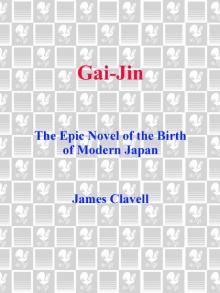 Gai-Jin
Gai-Jin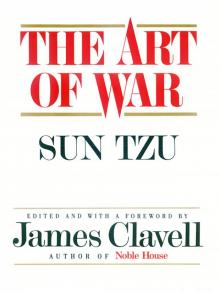 The Art of War
The Art of War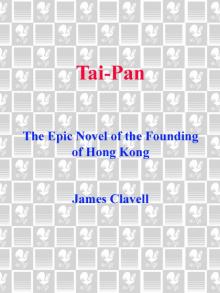 Tai-Pan
Tai-Pan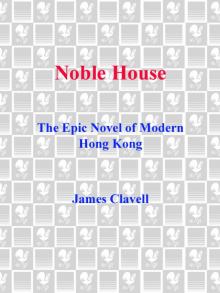 Noble House
Noble House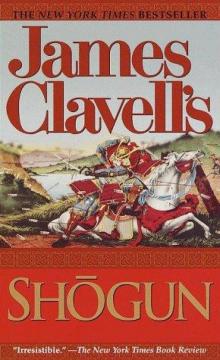 Shōgun
Shōgun Whirlwind
Whirlwind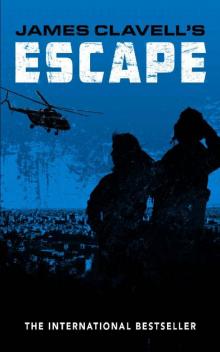 Escape
Escape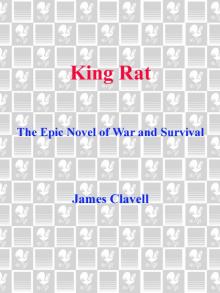 King Rat
King Rat The Children's Story
The Children's Story